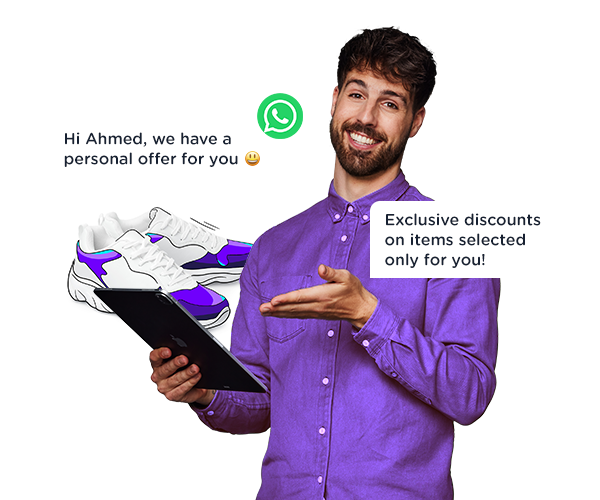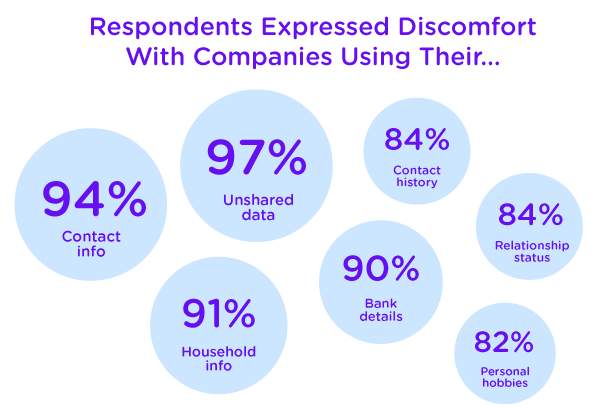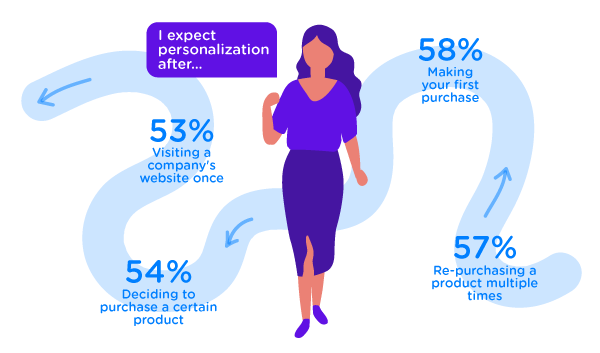
Consumers today expect personalization during the retail buying journey; it is no longer a ‘nice-to-have’ but a ‘must-have’. When asked to define personalization, McKinsey explained, "personalization is when organizations use data to tailor messages to specific users’ preferences", reaching "the right individual at the right moment with the right experiences" and that "consumers associated it with positive experiences that made them feel special." Personalization has become a key focus for many companies.
This growing expectation has made personalization a key focus for many companies, and at CM.com, we champion personalization as a critical focus. We firmly believe that companies should not only meet but surpass consumers' expectations. Customers should feel genuinely understood, valued, and relieved from repetitive questions, as retailers should already possess the necessary knowledge.
But, with so many options out there, what do consumers want when it comes to personalization? What matters most? And do consumers genuinely feel understood by brands? Essentially, are retailers getting it right when it comes to personalization?
To answer these questions, we conducted a survey among 1000 respondents in UAE, directly asking consumers about their preferences. Now, let's delve into the results and gain valuable insights.
Brands' personalization efforts are hindering and not helping their businesses. A significant 70% of respondents reported receiving irrelevant messages and notifications from retailers; promoting a type of coffee pod that does not match the coffee machine the consumer recently bought, for example. While 36% felt undervalued and treated as just one among many, and 25% expressed frustration over the inability to contact brands through their preferred channels.
These sub minimal personalization efforts mean that 28% of shoppers feel that companies fail to meet their personalization expectations, and 25% believe that brands do not understand their needs. Additionally, 17% of consumers expressed dissatisfaction with how companies communicate with them, lacking a sense of understanding.
Interestingly, when looking at the value of personalization, only 46% of consumers consider it unnecessary and unwanted. The majority, comprising 29% of respondents, disagree with this sentiment, emphasizing that personalization remains a crucial aspect of the overall customer experience.
While customized messages and promotions are appreciated, ensuring their relevance and delivery through preferred channels is essential. Customers can quickly become frustrated when bombarded with irrelevant content or pushed towards communication platforms they do not prefer. This frustration may lead them to switch to another brand or competitor. Maintaining a competitive edge is vital because heightened expectations can swiftly turn into disappointment if customer needs are not met.
But all is not lost. Some UAE retailers are using personalization effectively. Shoppers highlighted that brands provide the right information at the right time (41%), enable them to achieve their desired outcomes faster (39%), assure a seamless shopping process (44%), and eliminate the need to repeat basic information (27%). Given the money invested, these numbers are far too low. But it does demonstrate that the potential is there to curate positive experiences for customers and drive value. If retailers get the basics right.
Repeating basic information should no longer be necessary for today's era. Retailers who need to catch up must leverage profile and behavioral data to minimize unnecessary and irrelevant interactions. This approach prevents customers from feeling "misunderstood" or "unappreciated."
Adopting a one-to-one approach, rather than a one-to-many approach, will take personalization to the next level. Use personal data to match the needs and wants of every individual with relevant products and offerings; promoting a new face crème that fits perfectly with a consumer’s skin type based on previously purchased skincare products, for example.
Understanding your audience is crucial for a personalized approach, and data plays a vital role. However, consumers have reservations about certain data types. In our survey, respondents expressed discomfort with companies using their contact info (84%), unshared data (97%), bank details (90%), household info (91%), and relationship status (84%).
Expectations have shifted. Only 31% find it acceptable for purchase history to be used, for previous interactions this is just 16%. Similarly, only 25% are comfortable with companies accessing shopping behavior. These findings stress delivering value while maintaining trust.
The sentiment has shifted. Our previous research showed half of consumers expect customer service to have insights into their contact info, purchase history, and previous interactions. For retailers in general, this number is way lower.
It is important to note that different customers will be comfortable with different levels of personalization. Companies can use data to drive genuine insights that are responsive to consumer wishes and worries. Isn't that what truly effective personalization looks like?
Which company interactions would consumers like to be tailored to their needs? Nearly half (44%) of consumers express a preference for receiving personalized emails, 45% expect personalized customer service interactions, and 33% wish for a tailored website experience.
Furthermore, 25% of respondents desire the freedom to choose their preferred communication channel, whether it be one-to-one communication on WhatsApp, email, or live chat. Respondents expect varying degrees of personalization based on the communication channel. Most surprisingly, expectations are higher for email than face-to-face. These numbers show the massive discrepancy between what consumers want, and what businesses deliver. It's contradicting the common perception of inboxes being junk boxes, showing the need for better, more personalized e-mails.
These findings highlight the importance of personalizing customer communications across all channels, be it email, WhatsApp, or social media. Expectations for WeChat and email are even higher than for face-to-face communications. Personalization has become a fundamental expectation.
The quality of contact between consumers and companies is defined by multiple aspects. Consumers see trust as the most critical characteristic when purchasing products online, with 91% of respondents emphasizing its importance. At CM.com, we believe trust and personalization are strongly correlated and reinforce each other. Good personalization helps to build trust, and perceived service, creating more convenience and speedier interactions. Emphasizing personalization in these areas enhances the overall customer experience.
These areas (in)directly affect personalization, and vice versa you need personalization to establish all these aspects:
Trust and personalization reinforce each other. Consumers need trust before sharing details, but they’ll trust a company sooner if they feel the retailer knows and understands them.
In service, we’ve seen consumers prefer a personal touch. Our previous research shows emotions play a big role, and 88% expect empathy. Good customer service requires personalization.
Personalization helps reassure customers that the entire shopping process will proceed smoothly. When consumers feel confident in their purchase, their likelihood of buying increases.
What’s more convenient than consumers directly seeing the products they’re looking for? Personalization heavily impacts a positive customer experience by reducing effort.
If consumers feel understood and get the right messages and offers, they'll find their way to the checkout button faster. In service, a personal approach also speeds up the process.
Over half of the respondents indicated that personalization is most expected when they have previously purchased a product multiple times (57%). When deciding to purchase a specific product, 58% expect it. Think about a tailored abandoned cart notification. 54% expect it after buying and starting to use a product; and 54% when making the first purchase with a brand.
While expectations are lower at the beginning of the customer journey, still almost half (53%) expect it after visiting a web shop once or twice, and 25% when not actively seeking a product. It is crucial to maintain relevance throughout the entire journey.
Consumers have come to expect personalization, and companies that successfully implement personalization strategies can reap substantial rewards. What's more, those who are poorly personalizing are damaging their rapport with customers. By prioritizing relevance, trust, efficiency, and convenience, companies can deliver personalized experiences that delight their customers. It is crucial to ensure that personalization is seamless and free from frustration.
Looking ahead, consumers will continue to take control of their personal information, deciding whom to share it with and where. Privacy concerns will diminish as rules and legislation evolve. Consumers will also have greater control over the timing, location, and content of the messages they receive, enhancing relevancy and preventing them from being overwhelmed by excessive communication. So, take the initiative and elevate your personalization game to stand out from the competition and win the hearts of your customers.
CM.com conducted this research in cooperation with the independent research agency CANDID. The online survey was conducted in May 2023, where 1000 UAE respondents answered questions about their service interactions with businesses. All respondents were aged 18 years or older.
Want to find out how CM.com can help? Learn more about our solutions or contact us for more information.
Retail & eCommerceContact us





